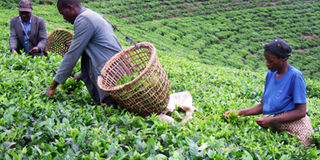Alur chiefdom ventures into tea growing

A tea plantation in western Uganda, where the crop is widely grown. Similarly, parts of West Nile can have plantations like this. FILE PHOTO
What you need to know:
As part of seeking ways to generate revenue and uplift the people, the revival tea growing is an option.
Most farmers in West Nile are not into tea growing but in some parts of what is now Zombo District, it was grown some decades ago. There was even a processing and packing plant in Paidha Town.
Some small-scale farmers were discouraged by prolonged droughts and pest attacks that impacted negatively on productivity and cost of tea production. Now the Alur chiefdom want to have an organised industry based on small-scale producers as a way to generate revenue.
Phillip Olarker Rauni III, the Alur chief, says this is aimed at socio-economic transformation a long-term goal of increasing production, sustainability and poverty reduction.
Open up opportunities
The tea growers have been given five million seedlings for the next planting season. “We are targeting over 10,000 tea growers since some areas have conducive weather and willingness by the farmers to grow tea with a view of improving their livelihood,” he said.
In Nebbi, areas were tea can be grown are in Ndhew and Erussi sub-counties and some parts of Nebbi sub-county while the whole of Zombo is favourable for tea growing. In the 1980s and 1990s, Okumu Ringa, former state minister for Public Service, had a processing and packaging plant for tea, which was largely grown in Zombo District.
The revival of tea growing could open opportunities for local investors to set up processing factories. Caesar Obomba, from Omoyo lower village in Nebbi Town, is one of those who have shown interest in tea growing. He observed that there was need to carry out a survey on sustainability and train the farmers on proper agronomic methods to avoid losses. “We need the training to boost our efforts to grow tea since we had been used to growing cotton only,” he said.
If well managed
Tea plants thrive in acidic soil and regions with heavy rainfall although they can be grown anywhere from sea level to high altitudes. Dr Edwin Wathum, the Kingdom’s prime minster, said the tea planting would also boost revenue of the kingdom and increase household income of the communities if well managed.
Alex Opua, who supplies tea seedlings, agreed that the beneficiaries need skills, knowledge and training since it is a new intervention.
The first crop of the tea planted will be ready in 18 months and the benefit will be realised within two years if well handled. The 5,000 acres will bring in Shs 2.5m per harvest weekly and 2,500 kilogrammes are harvested per acre and sold at 500 per kilo.




